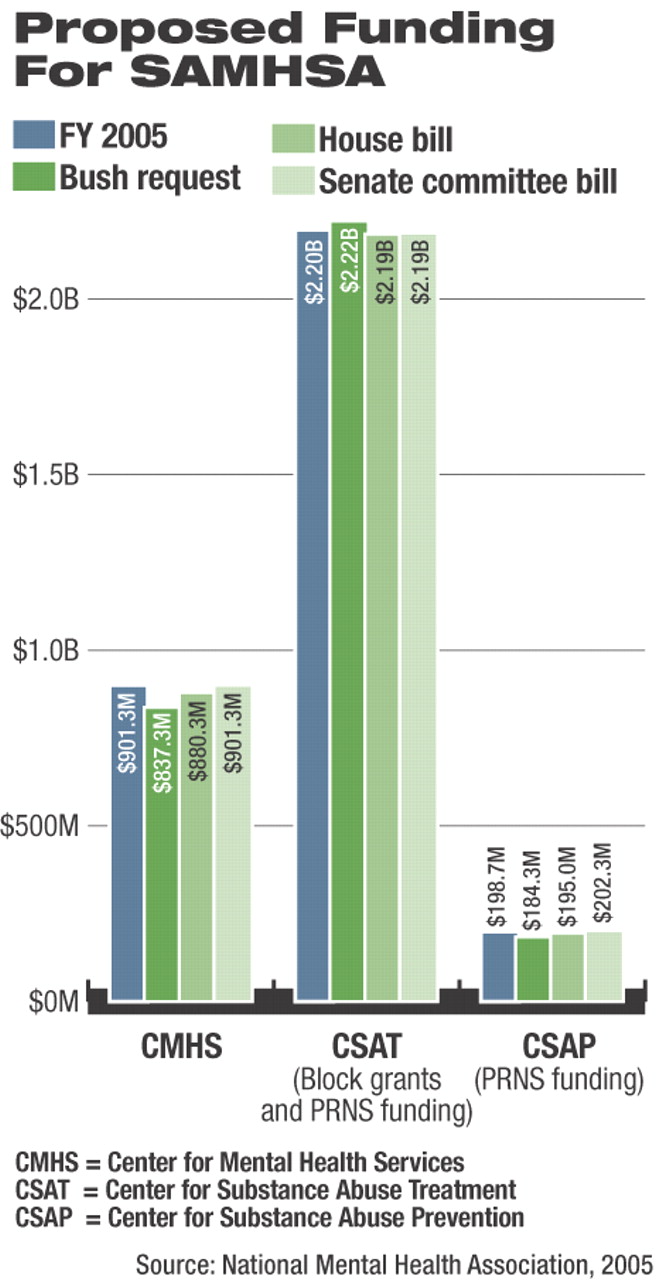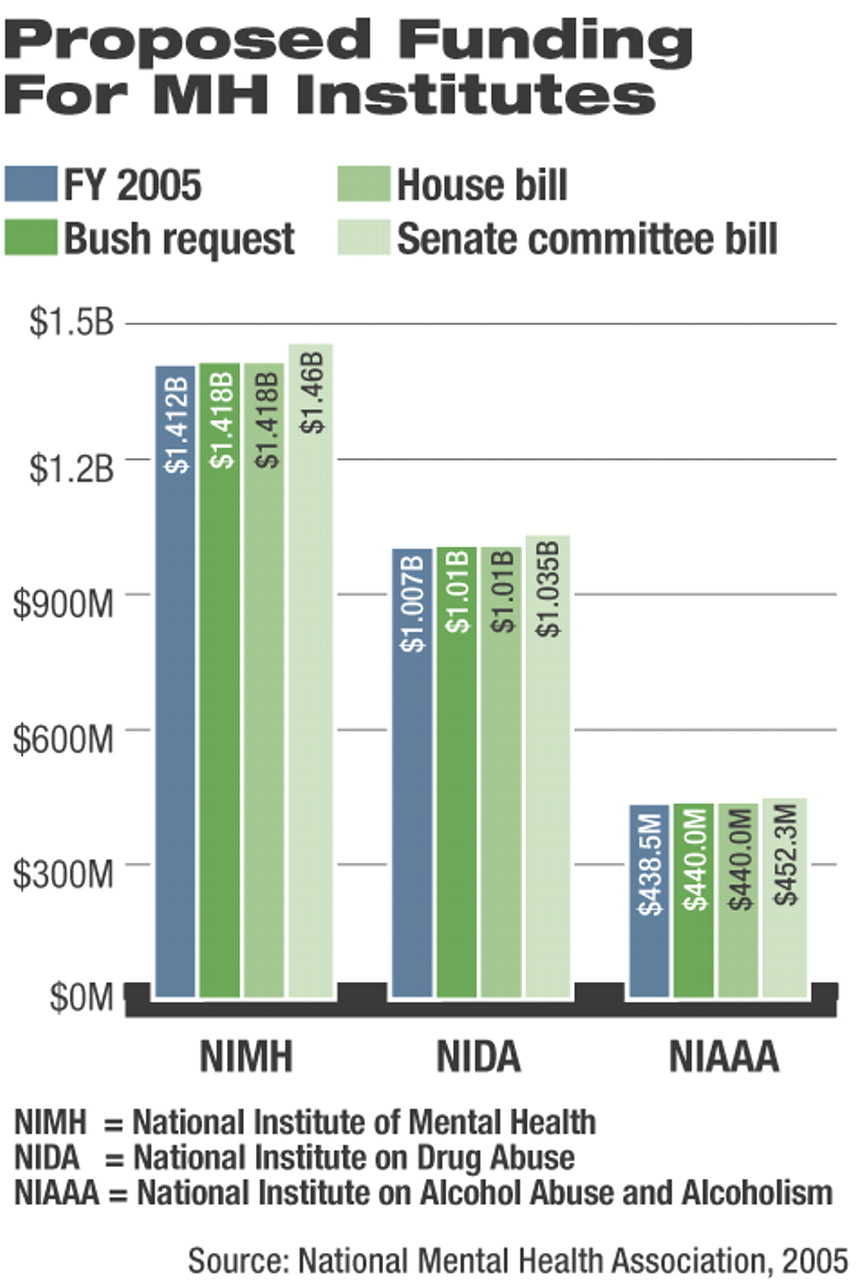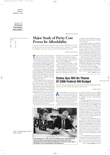Although differences remain in the mental health spending bills that await reconciliation, Congress appears poised to restore some of the funding that the Bush administration had proposed to cut from the federal budget for mental health programs and services.
All nonveteran federal mental health spending originates under the Department of Health and Human Services (HHS) budget for the National Institutes of Health (NIH) and the Substance Abuse and Mental Health Services Administration (SAMHSA).
Under separate bills, one passed by the House (HR 3010) and a Senate version of the same bill approved by the Senate Appropriations Committee, SAMHSA would receive $3.23 billion or $3.26 billion, respectively; both amounts exceed the Bush administration's $3.21 billion request, according to the agency. The NIH would receive $28.51 billion under the House bill and $29.41 billion under the Senate bill, while the president requested $28.51 billion (see chart on page 19).
Funding for one of SAMHSA's agencies, the Center for Mental Health Services (CMHS), was the focus of intense lobbying by the Mental Health Liaison Group, a coalition of mental health advocates led in part by APA. Those advocates said they were unable to achieve many of the program increases they sought, but their efforts resulted in proposed appropriations in both chambers at least maintaining Fiscal 2005 levels.
“The mental health community always needs more money, but given this fiscal environment, we're pretty pleased that we look to come out more or less intact in the House and Senate,” said Lizbet Boroughs, deputy director of APA's Department of Government Relations. “A lot of programs got totally whacked, and, comparatively, CMHS didn't do too badly.”
Following House approval of the Labor, Health and Human Services, Education, and Related Agencies appropriations bill in late June, the Senate subcommittee of the same name and then the full Appropriations Committee approved its version of the bill in July.
The Senate is expected to consider its bill this month, before the federal fiscal year ends September 30. Negotiators would then resolve funding differences in the completed bills. However, for several years the Senate has failed to approve an HHS appropriations bill, and the House-passed version has been rolled into a catchall omnibus appropriations bill that funds all departments whose budgets were as-yet unapproved.

CMHS Gets Boost
Both versions of the heavily-lobbied CMHS budget would increase spending above the president's $837.3 million request, with the House requesting $880.3 million and the Senate committee restoring funding to Fiscal 2005 levels of $901.3 million.
Among the leading APA priorities within CMHS, block grants remained static, with both House and Senate committee versions maintaining the $432.8 million Fiscal 2005 funding level, which the administration requested. Children's mental health funding also fared comparably, retaining its $105.2 million funding level in both chambers' bills, the same monies it received in Fiscal 2005.
Other CMHS areas in which the chambers' proposed funding remains at Fiscal 2005 levels are the PATH homeless programs, at $54.8 million, and the $34.3 million protection and advocacy program.
The CMHS Programs of Regional and National Significance (PRNS) is another focus of APA lobbying efforts. PRNS enables authorities to access information about promising methods for improving the performance of programs. The PRNS budget would face cuts in the House version from the Fiscal 2005 level of $274.3 million to $253.3 million, while the Senate committee bill would maintain the Fiscal 2005 funding level.
Under PRNS, both chambers' appropriations bills would increase State Incentive Transformation Grants—an APA priority—by $6 million to $26 million, matching the administration's request.
More contentious was the jail-diversion funding. The Bush administration had proposed a cut of $3.03 million, or 43 percent, from $6.94 million to $3.91 million. “The president took a big cut out of jail diversion, and the House and the Senate both restored that funding,” Boroughs said.
Also contentious were the State Infrastructure Grants. The funding for these grants, first offered in Fiscal 2005, were proposed to remain static at $26 million. This program led to a skirmish in the House when an amendment was offered to bar the use of funds in the bill to “create or implement any universal mental health screening program.” Opposition to the amendment was led by the appropriation bill's sponsor, Rep. Ralph Regula (R-Ohio), who said the amendment's aim was to “stigmatize the issue of mental health” (Psychiatric News, July 15). APA was among the groups that opposed the amendment, which was defeated.
Other PRNS programs' funding levels would remain at or slightly above their Fiscal 2005 levels. Youth violence prevention programs would receive $84 million under the House bill and $94.2 million in the Senate version, identical to Fiscal 2005 funding. Funding for post-traumatic stress disorder programs would remain at the Fiscal 2005 level, $29.8 million, under both House and Senate bills. Seniors programs would receive $5 million from the House and $4.96 million from the Senate, which is identical to current funding.
Additional PRNS programs include suicide prevention, which would remain steady at $16.5 million under the House bill and increase to $19 million under the Senate bill. Treatment development and community service centers for children who have experienced trauma would have funding remain at Fiscal 2005 levels of $1.98 million under all options. None of the bills fund community action grants.
Little Change in CSAT, CSAP Budgets
SAMHSA's Center for Substance Abuse Treatment (CSAT) would receive $1.776 billion for block grants, the same as Fiscal 2005, under both the House and Senate bills. A cut looks likely for CSAT's PRNS efforts, with $409.4 million approved in the House bill and $412.1 million in the Senate version, both down from the Fiscal 2005 level of $422.4 million.
The two chambers moved in opposite directions when proposing PRNS funding for the Center for Substance Abuse Prevention (CSAP), with the House passing a $3.7 million cut in Fiscal 2005 funding to $195 million and the Senate committee approving a $3.6 million increase to $202.3 million.
NIH Mental Health Funding Rises
All three of the NIH institutes related to mental health appear likely to receive a slight boost under both the House and Senate bills.
Fiscal 2005 funding for the National Institute of Mental Health of $1.412 billion would rise to $1.418 billion in the House bill and $1.46 billion in the Senate bill. Funding for the National Institute on Drug Abuse would rise from Fiscal 2005's $1 billion to $1.01 billion in the House bill and $1.035 billion in the Senate bill. Funding for the National Institute on Alcohol Abuse and Alcoholism would climb from $438.5 million in Fiscal 2005 to $440 million in the House bill and $452.3 million in the Senate bill.


